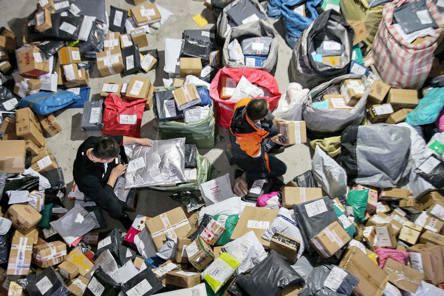The following article was published by Business Insider and can be viewed here.
Cheap, trendy clothes, $11 prescription glasses, cellphone accessories for a few dollars, all with free shipping: These are the hallmarks of modern e-commerce. And when the price is really, truly shockingly low, it's often because the products are skipping several levels of middlemen and going directly from China to customers' doorsteps.
Perhaps the most prominent example is Shein, an online fashion company known for unbelievably low prices and aggressive social-media marketing. With an estimated $30 billion valuation, it's likely to be the poster child for this cross-border e-commerce trend for some time.
"A lot of times, US consumers may purchase something online," ACI Logistix President Kevin Collins said, "and have zero clue that that item is being sourced from China directly."
Imports from China aren't new, of course. What's changing is that more Chinese companies are selling directly to American customers, rather than through US retailers.
The trend is spreading fast as those companies get more savvy at marketing their products to European and American consumers. Online marketplaces like Amazon and eBay are chock full of products shipped straight from China, too.
Instead of the standard eight-week journey by cargo ship, many e-commerce packages are now flying from Asia to the US, Collins told Insider. Thanks to customs brokers, freight forwarders, select airports, and specialized last-mile-delivery providers, packages can get from China to their destinations in three to 10 days.
Today, especially given the chaotic state of supply chains stateside, packages coming from Asia can sometimes reach buyers faster than those shipped from within the US.
What's changed?
It's not just the steady march of globalization driving this kind of cross-border e-commerce. International and domestic policy changes have helped.
In 2019, the Trump administration threatened to leave the Universal Postal Union, which dictates how the world's post offices work together. It said that some nations, especially China, were given an undue advantage in the existing postal-rate system, which made it extremely cheap to ship light items from China directly to American customers using China Post and the US Postal Service.
The former administration's threat pushed the UPU Congress to move to a system in which each country names its own rates for incoming shipments. Beginning in July 2020, the cost to ship light-weight packages from China to the US nearly doubled.
Along with the price rate changes, recently-installed streamlined customs procedures made it easier for private logistics firms to compete on price with traditional postal options. SEKO Logistics, for example, said it could undercut postal rates between China and the US by up to half after the rate changes. Plus, firms like SEKO have been working to add speed and more sophisticated tracking, even for cheaper packages, so getting a package from China through an alternative carrier, feels like getting one from UPS or FedEx.
Open field
The fast growth in cross-border shipping has led to a jumble of Chinese and US players growing fast and making up strategies as they go.
Big players like DHL, UPS, and FedEx often ship faster and still lead when it comes to high-value items and business shipments, Cathy Morrow Roberson, the president of Logistics Trends and Insights, told Insider.
But new configurations of Chinese companies and their US partners are competing on cost and gearing up to help boost Chinese sellers in a frenzied holiday season.
The following seven companies are seizing on the cross-border e-commerce trend, creating a fast lane for packages between China and the US.
4PX
HQ: Shenzhen, China
What it does: 4PX is a logistics provider specializing in software and fulfillment services for cross-border e-commerce. Founded in 2004, the company is partially owned by Singapore's national postal service and has warehouses in China, the US, Australia, the UK, and Germany. The company lists FedEx and UPS as express partners and provides logistics for e-commerce sales through eBay and AliExpress, among others.
SF Express
HQ: Jilin, China
What it does: SF Express is a logistics company often called the leading player in China. In terms of package volume, it's larger than UPS and FedEx, coming in closer to the USPS. SF Express has had warehouse assets in the US since 2017. That year, it entered a joint venture with UPS to increase cross-border shipments between China and the US. Earlier this year, SF Express acquired a majority stake in its Chinese competitor Kerry Logistics, which could bolster its international ambitions. It's also an investor in the US tech-enable freight forwarder Flexport.
YunExpress
HQ: Shenzhen, China; Hong Kong; Los Angeles; and Amsterdam
What it does: YunExpress is a Chinese logistics provider with a heavy emphasis on cross-border packages. The company offers a dedicated service for Amazon Marketplace sellers using Fulfillment by Amazon. It partners with UPS, FedEx, DHL, and other package carriers all over the world.
Pitney Bowes
HQ: Stamford, Connecticut
What it does: Pitney Bowes is an e-commerce-technology company that provides fulfillment and last-mile service stateside and consolidates e-commerce packages in China. The company's cross-border e-commerce volume grew 100% in the first quarter of 2021.
SEKO Logistics
HQ: Itasca, Illinois
What it does: SEKO Logistics has been expanding its services specifically to cater to cross-border e-commerce. In 2020, it acquired Air-City, a New York freight forwarder with cross-border e-commerce expertise. And this year, it acquired the French transportation group Bansard International after an influx of cash from Ridgemont Equity Partners in January. The company said earlier this year it would expand capacity in Shenzhen, China alone by 400%.
Cainiao
HQ: Hangzhou, China
What it does: Cainiao is the logistics arm of the Chinese e-commerce juggernaut Alibaba. Though the company's AliExpress platform offers cheap items for consumers all over the world, shipping has traditionally been slow so it can keep shipping costs low for customers. The company said its goal was to ship from China to anywhere in the world in 72 hours. Right now, that speed is available only on a small but growing number of items.
ACI Logistix
HQ: Long Beach, California
What it does: ACI Logistics is a US last-mile-delivery firm that specializes in cross-border e-commerce. The company works with sellers to optimize the flight path of packages so that they can be picked up at the airport nearest to the end consumer and reach their destination as soon as possible.
Source: Business Insider





